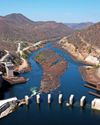
The headquarters of the Kawartha Lakes First Nation sits off a road 160km northeast of Toronto. Between ads for all-terrain vehicles, hand-scrawled messages on the three buildings decry government corruption.
At the centre of the lot stands a tipi. Alongside banners commemorating missing and murdered Indigenous women and the victims of Canada's residential school system, Confederate flags flap gently in the wind.
To its 20 members, this is the heart of Canada's newest First Nation. But seven local Indigenous chiefs claim it is the site of a brazen fraud that threatens to erode their hard-fought constitutional rights.
In recent years, Canada has grappled with a spate of "pretendian" cases - in which people falsely claim Indigenous identity. The use of Indigenous symbols and slogans has also grown increasingly common among the country's far right.
Members of Kawartha Lakes First Nation argue they are exempt from laws and taxes, echoing the rhetoric of the extremist sovereign citizens movement in the US, and their emergence has raised concerns over how groups may use Indigenous identity to lay claim to land or demand government concessions.
About two months ago, William Denby, the self-proclaimed "chief" of the Kawartha group, began emailing local chiefs, and municipal and provincial officials. Denby protested against the destruction of farmland for housing developments and made broad allegations of corruption. He said he was the hereditary leader of a forgotten Indigenous nation and claimed his group had rights to nearly 15,000 sq km of land.
At first, Taynar Simpson, the chief of Alderville First Nation, ignored the near-daily emails. But then, he said: "Against my better judgment, I decided to respond."
Diese Geschichte stammt aus der May 17, 2024-Ausgabe von The Guardian Weekly.
Starten Sie Ihre 7-tägige kostenlose Testversion von Magzter GOLD, um auf Tausende kuratierte Premium-Storys sowie über 8.000 Zeitschriften und Zeitungen zuzugreifen.
Bereits Abonnent ? Anmelden
Diese Geschichte stammt aus der May 17, 2024-Ausgabe von The Guardian Weekly.
Starten Sie Ihre 7-tägige kostenlose Testversion von Magzter GOLD, um auf Tausende kuratierte Premium-Storys sowie über 8.000 Zeitschriften und Zeitungen zuzugreifen.
Bereits Abonnent? Anmelden

Friendship interrupted
They were best mates. Then one had a baby, while the other struggled to conceive. They share their brutally honest takes on what happens when motherhood affects friendship

KERNELS OF HOPE
During the siege of Leningrad, botanists in charge of an irreplaceable seed collection, the first of its kind, had to protect it from fire, rodents-and hunger

A new horizon' The inverse link between cancer and dementia
Scientists have long been aware of a curious connection between these common and feared diseases. At last, a clearer picture is emerging

Across the universe
Samantha Harvey won the Booker prize with a novel set in space. Yet, she says, Orbital is actually 'a celebration of Earth's beauty with a pang of loss'

Frank Auerbach 1931 -2024
Saved from the Holocaust, this artist captured the devastation of postwar Britain as ifits wounds were his own but he ultimately found salvation in painting

Seven lessons I've learned after 28 years as economics editor
Margaret Thatcher was Britain's prime minister and Neil Kinnock was leader of the Labour party.

Droughtstricken dam leaves economies powerless
A ll is not well with the waters of Lake Kariba, the world's human-made lake largest A punishing drought has drained the huge reservoir close to record lows, raising the prospect that the Kariba Dam, which powers the economies of Zambia and Zimbabwe, may have to shut down for the first time in its 65-year history.

Let this be the end of these excruciating celebrity endorsements
I wish celebrities would learn the art of the French exit. But they can't, which is why Eva Longoria has announced she no longer lives in America. \"I get to escape and go somewhere,\" she explained.

Alive, but unable to thrive under absolute patriarchy
Since the Taliban returned to power, women and girls have tried defiance, but despair at their harshly restricted lives

‘It's tragic’ Reflection in the wake of Amsterdam violence
Carrying signs scrawled with messages urging unity, they laid white roses at the statue of Anne Frank, steps away from the home where her family had hidden from Nazi persecution.